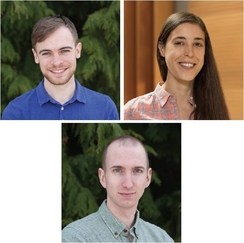IEEE PELS INDUSTRY/ACADEMIA SERIES - LUNCH AND LEARN ABOUT THE POWER ELECTRONIC DEVICES CHARACTERIZATION AND TEMPERATURE MEASUREMENT TECHNIQUES
We are pleased to host Daryl James, the president of OSENSA Innovations Corp. He will talk about Fiber optic temperature sensing for the power industry. We are also hosting Ettore Scabeni Glitz, Maria Celeste Garcia, and Matthieu Amyotte, three M.A.Sc. students from the University of British Columbia (UBC). They will present their work on characterization of power electronic devices.
Date and Time
Location
Hosts
Registration
-
 Add Event to Calendar
Add Event to Calendar
- 2332 Main Mall
- Vancouver, British Columbia
- Canada V6T 1Z4
- Building: Fred Kaiser Building
- Room Number: 2020
- Click here for Map
Speakers
 Daryl James of OSENSA Innovations Corp.
Daryl James of OSENSA Innovations Corp.
Fiber optic temperature sensing for the power industry
Fiber optic temperature sensing was first commercialized about 30 years ago, but until recently it has seen limited adoption in the power industry. Today, new advancements have made fiber optic temperature sensing much more affordable and opened the possibility to use this technology in places where high voltage or electrical noise make traditional wired temperature sensors impractical. In the power industry, fiber optic temperature sensors are now installed in low and medium voltage switch gear, transformers, generators, transmission cables, and elsewhere. Osensa Innovations develops, and markets so called “end-point” fiberoptic temperature sensors for these markets. This presentation will include an overview of competing fiber optic temperature sensing technologies and discuss how these different technologies have been deployed in various applications. It will also include a hands-on demonstration of Osensa’s fiber optic temperature sensor products.
Biography:
Daryl James founded Osensa Innovations Corp. in 2010, after spending over fifteen years developing optical technology products for local high-tech companies. Mr. James has a strong technical background in precision opto-mechanical systems, and is named as an inventor on a number of patents. Mr. James enjoys solving complex technical challenges by seeking the simplest solution and shortest path to success. This philosophy carries over into the way he manages OSENSA, in a very straightforward, lean and disciplined fashion. His passion for technology and business innovation allow him to create value and find opportunities in a wide range of markets.
 Ettore Scabeni Glitz, Maria Celeste Garcia, and Matthieu Amyotte of University of British Columbia
Ettore Scabeni Glitz, Maria Celeste Garcia, and Matthieu Amyotte of University of British Columbia
Thermal Characterization of Power Electronic Devices
Biography:
Ettore Scabeni Glitz was born in Curitiba, Brazil, and he received his Bachelor of Engineering degree from the Federal University of Technology in Parana, Brazil in 2016. He is currently a student in the Master of Applied Science in Electrical and Computer Engineering at the University of British Columbia in Vancouver, Canada. His research consists on the analysis of power losses in active components for power electronics topologies, focusing on the behaviour of the LLC resonant converter. Mr. Scabeni Glitz has been a recipient of a number of awards and scholarships during his studies, including the Science without Borders scholarship from the Brazilian government and the technical session presentation award from the IEEE Applied Power Electronics Conference and Exposition. Mr. Scabeni Glitz is also one of the inventors of a technology for pressure sensing based on the electrical signal generated by mobile ions in a piezoionic layer.
Maria Celeste Garcia Perez obtained her Ingeniera degree in Electronic Engineering at the National University of Comahue in Neuquén, Argentina. She is currently pursuing a Master in Applied Science in Electrical and Computer Engineering at the University of British Columbia. Her research interests include modeling and characterization of switch mode power electronic converters employing advanced device technologies such as Silicon-Carbide and Gallium-Nitride.
Matt Amyotte received his Bachelor of Science in Engineering Physics from the University of Alberta in Edmonton, Alberta in 2013. Following nearly 3 years of work experience in the oil and gas industry, he decided to shift his career focus to renewable energy and sustainable technology. This led him to return to academia to pursue his Master of Applied Science in Electrical and Computer Engineering at the University of British Columbia in Vancouver, Canada. His research interests focus on characterization of wide bandgap devices and their applications in new high-efficiency topologies. Mr. Amyotte has been a recipient of a number of awards and scholarships, including the APEGA Past Presidents' Medal in Engineering Physics as the top engineering physics graduate, and the NSERC Alexander Graham Bell Canada Graduate Scholarship.

